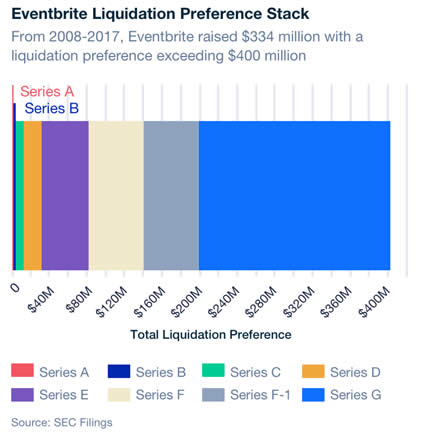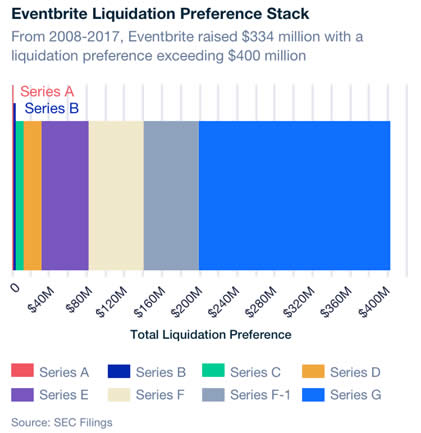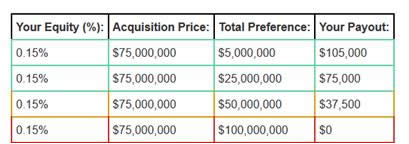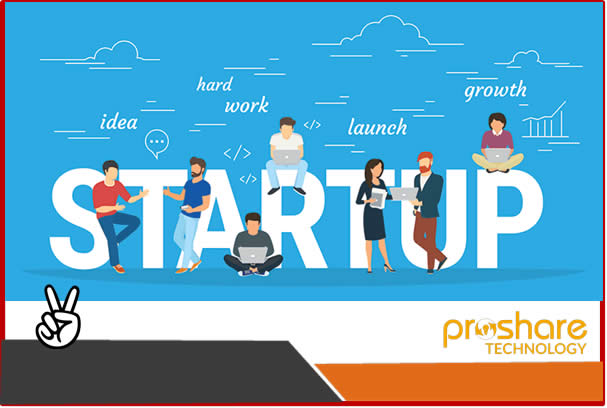Sunday, October 21, 2018 10.58AM / By AngelListBlog
In 2014, mobile security startup GoodTechnology was valued at $1.1 billion. Employees thought their equity packageswere winning lottery tickets. They were wrong.
One year later, Good sold for $425million. Employee share prices tumbled from $4.32 a share to $0.44. While executivesmade millions, employees—some of whom paid $100,000+ in taxes ontheir equity—made next to nothing.
Good Technology's situation isn'tuncommon. Like so many startups, it had investors and board members whoseequity was protectedby high liquidationpreference—a guarantee that they get paid first and at least acertain amount when the company sells. When startup investors make millions ina sale, but money runs dry before reaching employees, a bad preference stack isoften the cause.
To avoid being surprised when the companyyou work for is acquired, you need to understand what preferences are, whythey're important, and how you can negotiate around them.
What A Preference Stack Is & Why Startups Need Them
If your equity package works out to 0.1%of the company, shouldn't you be entitled to 0.1% of the acquisition? Startupfinancing isn't that simple.
When a startup is sold, the money itmakes is paid to shareholders in a predetermined order, called its “preference stack.”As a rule, employees are last, while shareholders with liquidation preference(LP) come first.
Three factors affect liquidation preference,and understanding them can give you a better sense of who gets paid how muchand when:
- Multiple: This decides how much money an investor will be paid. A 1x multiple—standard for mid-stage companies—guarantees the investors get 100% of their money back. Higher multiples become more common in later-stage companies.
- Seniority: This is an investor's place in the preference stack. Most unicorns have a “pari passu” structure, in which all investors with liquidation preference are paid simultaneously. However, between 2015 and 2016, there was a 60% increase in deals that gave “senior” preference to later-stage investors—meaning they get paid first.
- Participation: There are two types. In standard, “non-participating” preference, an investor with a 1x multiple and 10% ownership chooses to either be paid 1x of their investment or 10% of the acquisition price. In “participating” preference, the investor gets both. The latter arrangement is rare—as of 2014, only 31% of deals included participating preference, and they generally include a payout cap.
The more rounds of financing a companyraises, the more complicated its preference stack becomes. Eventbrite is a goodexample. At the time of its August IPO filing, the company had eight classes ofpreferred shares, averageamong unicorns. While Eventbrite's Series A through F-1 had been raised at 1xmultiples, its Series G was raised at a 1.5x multiple, and the resultingliquidation preference was huge:

While large preference stacks could ultimately mean less money trickles down toemployees in a sale, they exist for good reason: Liquidation preference giveinvestors the protection they need to make the high-risk investments that startupsthrive on.
Imagine an investor puts $3 million intoa young, eight-person company. In return, the investor gets 20% of the company.The two cofounders retain 70% of the company, and the other 10% is split evenlyamong the six employees.
If the company sells two month later for$5 million, the payouts would look like this:
- The investor's 20% would be worth $1 million.
- Each cofounder's 35% would be worth $1.25 million.
- Each employee's 1.66% would be worth $83,333.
The founders become millionaires, and theemployees each get a payout, but the investor loses $2 million. If there had been a 1xliquidation preference in place, the investor would be guaranteed to get $3million back.
How Liquidation Preference Controls Employee Equity
Imagine you get offered your dream job.The startup is growing fast, and the press has been lauding it as a futureunicorn. The company offers you an equity package that works out to 0.15%.Fantastic, right?
Well, how good that deal is or isn'tdepends on the company's preference stack. If the startup is carrying a hugepreference overhang, then your 0.15% may be worth very little. Imagine thecompany's funding history breaks down like the table below. This is a verysimple model, but you can see how the total amount of preference accumulatesfrom round to round:

To get a better sense of how preferencecould affect employee payout, take a look at the table below. It tracks thefinal value of your equity package depending on the startup's sale price:

The basic math is simple: In order foryour shares to be worth anything, your company's sale price needs to meet orexceed the value of its preference stack. The more money a startup raises, theharder it gets to fetch a high enough acquisition price.
As Ilya Strebulaev, a professor atStanford, notes in a study,“Some unicorns have made such generous promises to their preferred shareholdersthat their common shares [the share's employees get] are nearly worthless.”
How To Ask About Your Preference Stack
As an employee, there's not much you cando to affect your startup's preference stack. You can, however, understand whatyou're up against. When you're considering an offer, or even once you've beenhired, there are three questions you should ask your employer:
- “What was our most recent valuation?”
- “What is our current yearly growth rate?”
- “How much would the company need to sell for before my equity has value?”
If your most recent valuation is close toor exceeds the needed sale price, your equity offer has value. If the neededsale price is much higher than the company's most recent valuation, though, youhave something to consider: Based on its current growth rate, how many yearswould you need to stay before its value comes close to that needed sale price?
Are you comfortable investing that muchtime?
Equity alone should not decide whetheryou join a startup. A high salary, a great growth opportunity, or a mission youfeel passionate about can all make up for a modest equity package. Theimportant thing is to have realistic expectations about how much money yourequity could turn into.
Other Resources from AngelList
- WhatA Preference Stack Is & Why Startups Need Them
- HowLiquidation Preference Controls Employee Equity
- HowTo Ask About Your Preference Stack
Related News
1. World'sFirst Shared Trading Platform, Exchain, Launches Public Beta Test
2. TaxiTVRaises Seed Fund From Beta.Ventures
3. GreentreeInvestment Company Targets Funding Of Promising Nigerian Startups
4. PwCunveil Partnership to Boost Insurtech start-ups
5. DubaiInternational Financial Centre’s FinTech Ecosystem Gains Further Momentum In2018
6. ShenzhenInnovation and Entrepreneurship Bonds Boosting Development Of Innovative Firmsand Start-up
7. AnAdvice To Tech Start Up Founders – Incorporation, Fund Raising and EquitySharing
 Lagos, NG • GMT +1
Lagos, NG • GMT +1











 5404 views
5404 views






 Sponsored Ad
Sponsored Ad
 Advertise with Us
Advertise with Us









